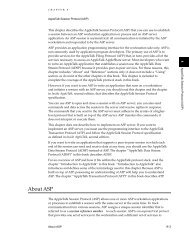URL Loading System Programming Guide - Apple Developer
URL Loading System Programming Guide - Apple Developer
URL Loading System Programming Guide - Apple Developer
Create successful ePaper yourself
Turn your PDF publications into a flip-book with our unique Google optimized e-Paper software.
Authentication Challenges and TLS Chain Validation<br />
An NS<strong>URL</strong>Request object often encounters an authentication challenge, or a request for credentials from<br />
the server it is connecting to. The NS<strong>URL</strong>Session, NS<strong>URL</strong>Connection, and NS<strong>URL</strong>Download classes notify<br />
their delegates when a request encounters an authentication challenge, so that they can act accordingly.<br />
Important: The <strong>URL</strong> loading system classes do not call their delegates to handle request challenges unless<br />
the server response contains a WWW-Authenticate header. Other authentication types, such as proxy<br />
authentication and TLS trust validation do not require this header.<br />
Deciding How to Respond to an Authentication Challenge<br />
If an NS<strong>URL</strong>Request object requires authentication, the way that the challenge is presented to your app varies<br />
depending on whether the request is performed by an NS<strong>URL</strong>Session object, an NS<strong>URL</strong>Connection object,<br />
or an NS<strong>URL</strong>Download object:<br />
●<br />
●<br />
●<br />
If the request is associated with an NS<strong>URL</strong>Session object, all authentication requests are passed to the<br />
delegate, regardless of authentication type.<br />
If the request is associated with an NS<strong>URL</strong>Connection or NS<strong>URL</strong>Download object, that object’s delegate<br />
receives a connection:canAuthenticateAgainstProtectionSpace: (or<br />
download:canAuthenticateAgainstProtectionSpace:) message. This allows the delegate to<br />
analyze properties of the server, including its protocol and authentication method, before attempting to<br />
authenticate against it. If your delegate is not prepared to authenticate against the server’s protection<br />
space, you can return NO, and the system attempts to authenticate with information from the user’s<br />
keychain.<br />
If the delegate of an NS<strong>URL</strong>Connection or NS<strong>URL</strong>Download object does not implement the<br />
connection:canAuthenticateAgainstProtectionSpace: (or<br />
download:canAuthenticateAgainstProtectionSpace:) method and the protection space uses<br />
client certificate authentication or server trust authentication, the system behaves as if you had returned<br />
NO. The system behaves as if you returned YES for all other authentication types.<br />
Next, if your delegate agrees to handle authentication and there are no valid credentials available, either as<br />
part of the requested <strong>URL</strong> or in the shared NS<strong>URL</strong>CredentialStorage, the delegate receives one of the<br />
following messages:<br />
2013-10-22 | Copyright © 2003, 2013 <strong>Apple</strong> Inc. All Rights Reserved.<br />
53
















